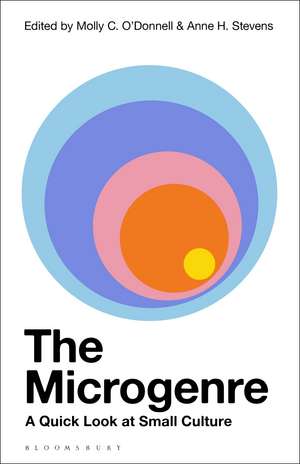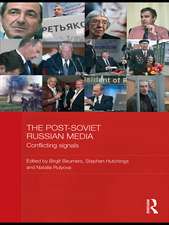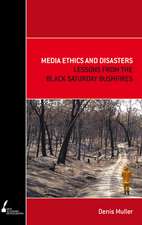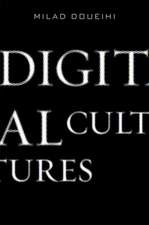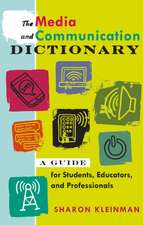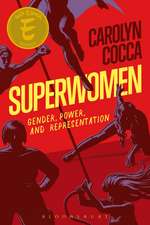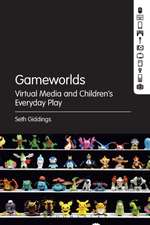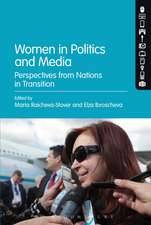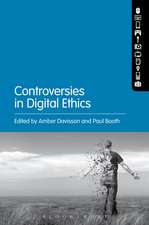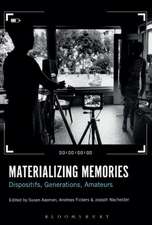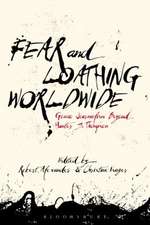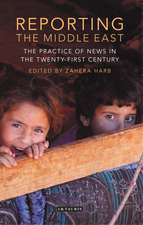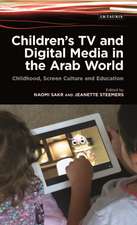The Microgenre: A Quick Look at Small Culture
Editat de Anne H. Stevens, Molly C. O’Donnellen Limba Engleză Paperback – 22 ian 2020
| Toate formatele și edițiile | Preț | Express |
|---|---|---|
| Paperback (1) | 165.91 lei 3-5 săpt. | |
| Bloomsbury Publishing – 22 ian 2020 | 165.91 lei 3-5 săpt. | |
| Hardback (1) | 567.00 lei 6-8 săpt. | |
| Bloomsbury Publishing – 22 ian 2020 | 567.00 lei 6-8 săpt. |
Preț: 165.91 lei
Preț vechi: 192.44 lei
-14% Nou
Puncte Express: 249
Preț estimativ în valută:
31.75€ • 32.95$ • 26.54£
31.75€ • 32.95$ • 26.54£
Carte disponibilă
Livrare economică 24 februarie-10 martie
Preluare comenzi: 021 569.72.76
Specificații
ISBN-13: 9781501345807
ISBN-10: 150134580X
Pagini: 224
Dimensiuni: 140 x 216 x 36 mm
Greutate: 0.34 kg
Editura: Bloomsbury Publishing
Colecția Bloomsbury Academic
Locul publicării:New York, United States
ISBN-10: 150134580X
Pagini: 224
Dimensiuni: 140 x 216 x 36 mm
Greutate: 0.34 kg
Editura: Bloomsbury Publishing
Colecția Bloomsbury Academic
Locul publicării:New York, United States
Caracteristici
Brings together scholars and critics from multiple disciplines discussing multiple forms, helping make connections across disparate fields, such as: media studies, classics, history, anthropology, and literary studies
Notă biografică
Molly C. O'Donnell is an instructor in the Department of English at James Madison University, USA. She was the recipient of the Gaskell Journal Joan Leach Memorial Prize (2016), and her work has appeared in publications like Victoriographies and The Norton Introduction to Literature, 11th ed. (2013).Anne H. Stevens is the author of British Historical Fiction before Scott (2010) and Literary Theory and Criticism: An Introduction (2015). She is chair of Interdisciplinary, Gender, and Ethnic Studies and Professor of English at the University of Nevada, Las Vegas, USA.
Cuprins
AcknowledgementsIntroduction (Molly C. O'Donnell, James Madison University, USA and Anne H. Stevens, University of Nevada, Las Vegas, USA)Chapter 1The Myron's Cow Epigraph (Paul Hay, Western Reserve University, USA)Chapter 2The Premature Ejaculation Poem (Christopher Vilmar, Salisbury University, USA)Chapter 3Prostitute Narratives of Ancien Régime France (Alistaire Tallent, Colorado College, USA)Chapter 4The Neoclassical Plague Romance (Matthew Duques, University of North Alabama, USA)Chapter 5Anesthesia Fiction (Jennifer Diann Jones, University of Portsmouth, USA)Chapter 6Magic-Portrait Fiction (Diana Bellonby, Vanderbilt University, USA) Chapter 7Topographical Reports of the American Frontier (John Hay, University of Nevada, Las Vegas, USA)Chapter 8Grangerism (Megan Becker-Leckrone, University of Nevada, Las Vegas, USA)Chapter 9Shirley Temple's "Baby Burlesks" (Nora Gilbert, University of North Texas, USA)Chapter 10Nudie-Cuties (Cynthia J. Miller, Emerson College, USA, and Thomas M. Shaker, independent scholar)Chapter 11Giallo (Gavin F. Hurley, University of Providence, USA)Chapter 12Nuclear Realism (John Carl Baker, Nuclear Field Coordinator and Senior Program Officer, Ploughshares Fund)Chapter 13Anti-Sitcom Video Art (Susanna Newbury, University of Nevada, Las Vegas, USA)Chapter 14Home Depot Art (Danielle Kelly, Lake Forest College, USA)Chapter 15The Mommy Memoir (Mary Thompson, James Madison University, USA)Chapter 16Minecraft Fiction (Michael T. Wilson, Appalachian State University, USA)Chapter 17Heavy Metal Microgenres (Heather Lusty, University of Nevada, Las Vegas, USA)Chapter 18Mexican Neo-Surf Microgenres (Aurelio Meza, Concordia University, Canada)Chapter 19Fanfiction Microgenres (Elyse Graham, Stony Brook University, USA and Michelle Alexis Taylor, Harvard University, USA)Chapter 20Machine-Classified Microgenres (Jonathan Goodwin, University of Louisiana at Lafayette, USA)Notes on ContributorsIndex
Recenzii
The essays collected in O'Donnell's and Stevens's The Microgenre address a timely topic: groups of texts previously considered unworthy of critical attention because of their ephemerality, faddishness, or shared eccentricity have now become objects of serious historical interest because those qualities link them to the "microgenres" generated by algorithmic targeting of consumers of digital media. The wide range of examples makes this recommended reading for literary historians, genre theorists, and students of popular culture alike.
Microgenres fascinate because of their startling specificity. But this book is much more than a fascinating bestiary. In surveying the oddly precise niches occupied by "plague romances" and "baby burlesks," The Microgenre also advances a macroscopic argument. The editors explain why this hyper-specific mode of description has become one of the central critical innovations of our own century, and demonstrate that it can help us understand the rough-edged and provisional character of genres long past.
Microgenres fascinate because of their startling specificity. But this book is much more than a fascinating bestiary. In surveying the oddly precise niches occupied by "plague romances" and "baby burlesks," The Microgenre also advances a macroscopic argument. The editors explain why this hyper-specific mode of description has become one of the central critical innovations of our own century, and demonstrate that it can help us understand the rough-edged and provisional character of genres long past.
